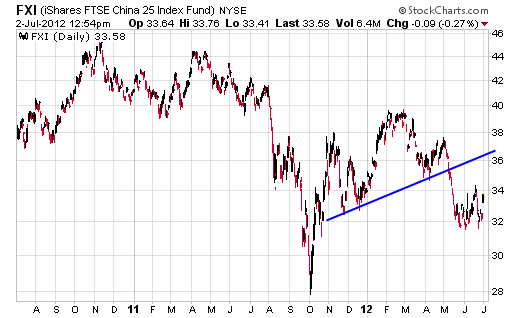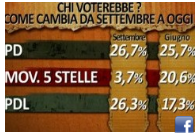But the concept of inflation is poorly understood. In today’s world it is thought of as simply rising prices due to shortages. In economics there are several forms of inflation that appear in different circumstances.
Overall governments favor low inflation because it gives the appearance of rising wealth as prices rise, provided that these levels are restrained around, say 3%. Above that and savings are visibly damaged and consequently the economic power of a nation.
But we are moving far away from such a concept now. In today’s world the bulk of inflation has come from rising oil prices [an insidious, usually imported inflation] and the like. At the moment, we are at a time when inflation is at very low levels, so low they no longer represent a fear or concern.
Deflation is now the global fear, far more so in the developed world than in the emerging world. But the deflation we are talking about is not simply an economic slowdown. Today’s deflation is a decay of trust, of confidence and consequently, hope. Deflation breeds prudence, caution, discouragement, which attacks growth. Banks slow down their lending, delay the processing of loan requests, take only very secured collateral for their loans. Individuals save in the hope that they can manage those rainy days they see coming.
As the current type of deflation persists, it accelerates slowly but surely. Central banks [particularly Mr. Bernanke] are aware of this and try to simply promote an expansion of money that replaces lost asset values and no more. It is critical that no more than has been lost to asset/debt deflation, be added.
There is a point where adding too much by way of newly issued money, that it is inflationary, cheapening the price and value of currency itself. This inflation is a very different animal to the one the public perceives it to be. As deflation rises, so there is a point where inflation takes off and becomes much more difficult to control. In fact, that point becomes ever more mercurial as deflations spreads and confidence continues to sag, as it continues to do in the States and in Europe right now. It is probably a misnomer to call it inflation because it is a cheapening of the value of money.
Since 2008 we have seen the process of money creation happen first through QE, then as the European Central Bank used swap arrangements with the Fed to do the same, through the unlimited window of credit to European banks. This has left the banking system relatively solvent, when it would have collapsed without it. But what looks to be a set of now relatively healthy balance sheets ignores the continuing asset/debt deflation that goes on unabated. The reason it becomes mercurial in nature is because new money issues have less and less affect as the deflation progresses. As this ineffectiveness in producing greater economic activity grows, the only answer appears to be to defer, or seemingly halt, more deflation and recession, so more money is issued. This is where the current impasse between Germany and the weaker members of the Eurozone are in conflict now.
But more new money can only provide a temporary solution, because it is only greater economic activity that can resolve the problem. It is growth that produces economic health and the ability to repay debt.
As debt mires such growth reliance on new money at some point exacerbates the problem giving rise to a greater and greater demand for more money. Money cheapens during the process, but if governments can act in concert to stop that from being seen in falling exchange rates, then an atmosphere of normalcy is maintained. This does fool most people for a while, but its fragility grows. We are now seeing an exchange rate between the dollar and the euro moving so little that it is hiding the real extent of the Eurozone crisis!
At some point politicians and bankers have to make an extremely difficult choice. Do they let the economy suffer the full range of symptoms of deflation, or, for the sake of political stability and civil calm, do we keep patching up the mess with bandages of ‘new money’. With votes needed to continue their careers, politicians are likely to go for the soft option of ‘new money.’
Loss of asset value hits cash too
During this time the value of savings are destroyed either through providing no, or nearly no real return, as we see now in the States and almost in Europe, or all [except cash holdings] drop in price. As interest rates are unlikely to rise for the next couple of years, cash yields are nearly zero.
You would think that savings wouldn’t drop in value during deflation and that with asset prices falling, the old adage that “cash is king” would hold true. It doesn’t, because in this global world of ours, exchange rates can easily decay and lower the international value of cash. As this happens, imported goods increase in value giving cash less buying power. So we have to re-define what we mean when we say “cash is king”. What cash? U.S. dollars [it has a coming debt crisis that dwarfs that of Europe, postponed by the system of monetary and fiscal union it has] or the Swiss Franc [the government is holding the exchange rate down, killing it as a ‘safe-haven’ or the Yen [they are doing the same as the Swiss]? Many investors are turning to property in the belief that that will hold value in the most cosmopolitan of nations and cities. But will it? The evidence is that only in relatively exclusive cities is this happening, but in many nations property has failed to retain value.
Demand for liquidity blossoms
Then there comes a point where the demand for liquidity continues to grow and overwhelm the liquidity available [remaining stagnant in favored pools, in banks and balance sheets, too fearful to venture outside].
At this point we see the “Black Hole” of deflation sucking in more and more money. So just to stand still and hold what economic activity there is, the demand for money continues to grow and overwhelm whatever is thrown at it, but still not producing greater economic activity.
And this is the trigger point, when cash deflates in value. This is the start of runaway inflation, producing no good at all. Money itself has lost confidence and ceases to be an expression of value as its issuance accelerates. At its worst this process becomes hyperinflation.
By this time businesses are collapsing, banks failing and the only people who are thriving are those who avoid money, changing it into some asset or goods immediately it is received.
For example;
One must own the farm that produces food, own the transport that takes it to market, own the market stall and have access to asset into which to change it before its value is depleted.
Meanwhile, social extremes are being seen in politics, at community levels when stress takes a firm grip on ordinary citizen’s lives. The social consequences of the process scar entire generations.
Right now it is that fear that is holding back Germany from loosening the reins on its solvency as memories of the Weimar Republic and its hyperinflation in 1923 re-surface in the following generations.
During this entire process of deflation, fuelling growing inflation, politicians come under greater and greater pressure to do something. But the system of Democracy itself mitigates against their ability and willingness to take effective action! It takes a collapse of the monetary system and political system, before there is sufficient will in people to rectify matters.
You, the reader, have to decide not just where we are in this process but can it be halted now? Is there the political and financial will to halt the process or are we silently watching that point pass in the calming waters of media and political reassurance? How close to such extremes happening are we now?
What happens to gold and silver during this time?
The joys of both silver and gold are that they are both cash and an asset at the same time.
– Gold and silver can’t be printed.
– They have always been internationally accepted cash.
– More importantly they are acceptable in the world’s monetary system as money in the form of reserve assets.
– Gold becomes collateral that facilitates loans at cheaper interest rates.
These qualities grow throughout the above deflation and subsequent inflation.

Member’s only:
Part 3 –
– Measures of value and eventual confiscation
– Tier I Asset?
– Gold Confiscation
Get the rest of the article. Subscribe @
www.GoldForecaster.com / www.SilverForecaster.com



















